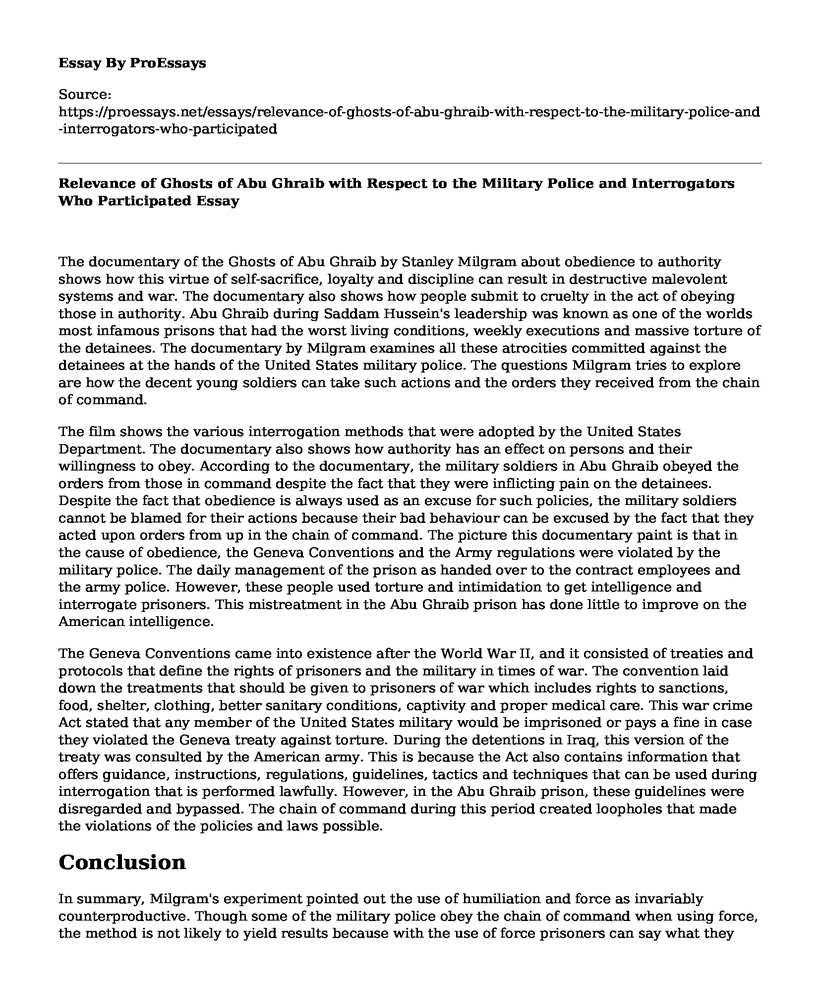The documentary of the Ghosts of Abu Ghraib by Stanley Milgram about obedience to authority shows how this virtue of self-sacrifice, loyalty and discipline can result in destructive malevolent systems and war. The documentary also shows how people submit to cruelty in the act of obeying those in authority. Abu Ghraib during Saddam Hussein's leadership was known as one of the worlds most infamous prisons that had the worst living conditions, weekly executions and massive torture of the detainees. The documentary by Milgram examines all these atrocities committed against the detainees at the hands of the United States military police. The questions Milgram tries to explore are how the decent young soldiers can take such actions and the orders they received from the chain of command.
The film shows the various interrogation methods that were adopted by the United States Department. The documentary also shows how authority has an effect on persons and their willingness to obey. According to the documentary, the military soldiers in Abu Ghraib obeyed the orders from those in command despite the fact that they were inflicting pain on the detainees. Despite the fact that obedience is always used as an excuse for such policies, the military soldiers cannot be blamed for their actions because their bad behaviour can be excused by the fact that they acted upon orders from up in the chain of command. The picture this documentary paint is that in the cause of obedience, the Geneva Conventions and the Army regulations were violated by the military police. The daily management of the prison as handed over to the contract employees and the army police. However, these people used torture and intimidation to get intelligence and interrogate prisoners. This mistreatment in the Abu Ghraib prison has done little to improve on the American intelligence.
The Geneva Conventions came into existence after the World War II, and it consisted of treaties and protocols that define the rights of prisoners and the military in times of war. The convention laid down the treatments that should be given to prisoners of war which includes rights to sanctions, food, shelter, clothing, better sanitary conditions, captivity and proper medical care. This war crime Act stated that any member of the United States military would be imprisoned or pays a fine in case they violated the Geneva treaty against torture. During the detentions in Iraq, this version of the treaty was consulted by the American army. This is because the Act also contains information that offers guidance, instructions, regulations, guidelines, tactics and techniques that can be used during interrogation that is performed lawfully. However, in the Abu Ghraib prison, these guidelines were disregarded and bypassed. The chain of command during this period created loopholes that made the violations of the policies and laws possible.
Conclusion
In summary, Milgram's experiment pointed out the use of humiliation and force as invariably counterproductive. Though some of the military police obey the chain of command when using force, the method is not likely to yield results because with the use of force prisoners can say what they want. The result of this is that interrogators fail to get the right information. Under the Geneva treaty, the guidelines laid out ensure that prisoners retain their rights for fair hearing and interrogations. Finally, since people act mostly in obedience to those in the higher chain of command, it is advisable that the seniors ensure that the guidelines of the Geneva Convention are followed to ensure that the interrogators uphold the human rights of prisoners.
Cite this page
Relevance of Ghosts of Abu Ghraib with Respect to the Military Police and Interrogators Who Participated. (2021, Jun 23). Retrieved from https://proessays.net/essays/relevance-of-ghosts-of-abu-ghraib-with-respect-to-the-military-police-and-interrogators-who-participated
If you are the original author of this essay and no longer wish to have it published on the ProEssays website, please click below to request its removal:
- Singer and Friedman's' Cuban Musical Expression in New York
- The Monroe Doctrine Essay Example
- Essay Sample on Texas Media Organizations
- Chapter Analisys of the Book on Criminological Theory Paper Example
- Pros and Cons of Cannabis Legalization in Canada - Essay Sample
- Exploring Hip Hop: An Ageless Art Form With Evolving Characteristics - Essay Sample
- Research Paper on D-Day: Operation Bodyguard and the Normandy Invasion







